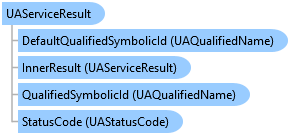

OPC Studio User's Guide and Reference
UAServiceResult Class


'Declaration<ComDefaultInterfaceAttribute(OpcLabs.EasyOpc.UA.ComTypes._UAServiceResult)> <ComVisibleAttribute(True)> <ExceptionContractAnnotationAttribute(True)> <GuidAttribute("FD8498B2-E9F1-4636-98FB-8462190804D0")> <TypeConverterAttribute(System.ComponentModel.ExpandableObjectConverter)> <CLSCompliantAttribute(True)> <ValueControlAttribute("OpcLabs.BaseLib.Forms.Common.ObjectSerializationControl, OpcLabs.BaseLibForms, Version=5.82.174.1, Culture=neutral, PublicKeyToken=6faddca41dacb409", DefaultReadWrite=False, Export=True, PageId=10001)> <SerializableAttribute()> Public NotInheritable Class UAServiceResult Inherits OpcLabs.BaseLib.Info Implements LINQPad.ICustomMemberProvider, OpcLabs.BaseLib.ComTypes._Info, OpcLabs.BaseLib.ComTypes._Object2, OpcLabs.EasyOpc.UA.ComTypes._UAServiceResult, System.ICloneable, System.IFormattable, System.Runtime.Serialization.ISerializable, System.Xml.Serialization.IXmlSerializable
'UsageDim instance As UAServiceResult
[ComDefaultInterface(OpcLabs.EasyOpc.UA.ComTypes._UAServiceResult)] [ComVisible(true)] [ExceptionContractAnnotation(true)] [Guid("FD8498B2-E9F1-4636-98FB-8462190804D0")] [TypeConverter(System.ComponentModel.ExpandableObjectConverter)] [CLSCompliant(true)] [ValueControl("OpcLabs.BaseLib.Forms.Common.ObjectSerializationControl, OpcLabs.BaseLibForms, Version=5.82.174.1, Culture=neutral, PublicKeyToken=6faddca41dacb409", DefaultReadWrite=false, Export=true, PageId=10001)] [Serializable()] public sealed class UAServiceResult : OpcLabs.BaseLib.Info, LINQPad.ICustomMemberProvider, OpcLabs.BaseLib.ComTypes._Info, OpcLabs.BaseLib.ComTypes._Object2, OpcLabs.EasyOpc.UA.ComTypes._UAServiceResult, System.ICloneable, System.IFormattable, System.Runtime.Serialization.ISerializable, System.Xml.Serialization.IXmlSerializable
[ComDefaultInterface(OpcLabs.EasyOpc.UA.ComTypes._UAServiceResult)] [ComVisible(true)] [ExceptionContractAnnotation(true)] [Guid("FD8498B2-E9F1-4636-98FB-8462190804D0")] [TypeConverter(System.ComponentModel.ExpandableObjectConverter)] [CLSCompliant(true)] [ValueControl("OpcLabs.BaseLib.Forms.Common.ObjectSerializationControl, OpcLabs.BaseLibForms, Version=5.82.174.1, Culture=neutral, PublicKeyToken=6faddca41dacb409", DefaultReadWrite=false, Export=true, PageId=10001)] [Serializable()] public ref class UAServiceResult sealed : public OpcLabs.BaseLib.Info, LINQPad.ICustomMemberProvider, OpcLabs.BaseLib.ComTypes._Info, OpcLabs.BaseLib.ComTypes._Object2, OpcLabs.EasyOpc.UA.ComTypes._UAServiceResult, System.ICloneable, System.IFormattable, System.Runtime.Serialization.ISerializable, System.Xml.Serialization.IXmlSerializable
There is an implicit conversion to System.Int32, which takes the code bits of the StatusCode. You can use this to make a comparison with some value from the UACodeBits class easily.
There are implicit conversions from this type to:
System.Object
OpcLabs.BaseLib.Object2
OpcLabs.BaseLib.Info
OpcLabs.EasyOpc.UA.UAServiceResult